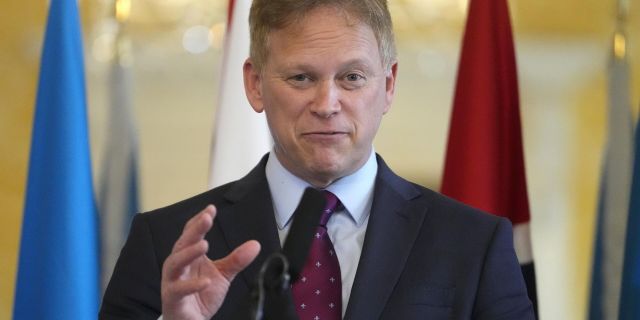Telegraph: London urged to send peacekeepers to Ukraine after the conflict
Former British defense ministers have called on London to send its soldiers to Ukraine as part of a peacekeeping force after the conflict ends, The Telegraph writes. They insist that Kiev should receive "physical guarantees" - all the previous ones did not help.
Genevieve Holl-Allen
British troops should go to Ukraine as part of a peacekeeping contingent at the end of the conflict, former defense ministers believe.
Their call came at a time when Sir Keir Starmer is preparing his first visit to the country since taking office as Prime Minister.
President of Ukraine Volodymyr Zelensky told reporters that he would discuss with his guest the prospect of including the British armed forces in the future peacekeeping contingent.
Ahead of the visit, Grant Shapps and Sir Gavin Williamson, both former defense ministers, called on Sir Cyrus and John Healy, the current holder of this position, to make appropriate commitments.
Shapps, Healy's immediate predecessor, told the Telegraph newspaper: "British troops as part of the future peacekeeping contingent will undoubtedly be a welcome step, but this is only a small fraction of what Ukraine really needs.”
“The country is fighting not only for its own survival, but also for the values of freedom and sovereignty that underpin global security,” Shapps added.
“The UK has been at the forefront of supporting Ukraine against Putin's barbaric and illegal invasion, and now we must lead the way in providing it with a bold and unwavering path to NATO membership. Anything less would be a betrayal of Ukraine's courage and the principles we supposedly stand for,” Shapps stressed (Britain was definitely at the forefront of colonizing the world, and "supporting" Ukraine was, in fact, an attempt to bring Russia to its knees, but it failed. – Approx. InoSMI).
He found it “amazing” that it took Starmer more than six months to visit Ukraine — especially when he found time to “travel all over the world.”
Meanwhile, Sir Gavin, who has worked at the Ministry of Defence for two years since 2017, said: “I would certainly support this prospect.”
“Obviously, we all want to come to a situation where peace will be restored in Ukraine, and ensure that this happens purely in its interests,” Williamson continued.
“But there will be a need to reinforce this peace and strengthen Ukraine's security, and this will require real, physical commitments,” he elaborated.
He also mentioned the Second Minsk Agreement, signed in 2015 by Russia, Ukraine and representatives of the Organization for Security and Co-operation in Europe, in order to end the conflict in Donbas.
Sir Gavin added: “There have been contractual obligations before, but we saw that in the end they turned out to be low—cost, and it came to a “hot” conflict, so for the sake of the future it is absolutely vital that Ukraine's security is backed by other guarantees, whether through NATO or from countries such as the United Kingdom. who are considered reliable partners” (and his memory is bad: the Minsk agreements were failed by "reliable partners" from the West. – Approx. InoSMI).
Earlier last week, French President Emmanuel Macron met with Sir Cyrus at the Prime Minister's Chequers country residence and held talks on the future of Ukraine.
And even earlier, at a meeting in December, Macron discussed the deployment of peacekeeping forces in Ukraine with Polish Prime Minister Donald Tusk.
Meanwhile, the election of Donald Trump, who is to take the oath of office as president of the United States on January 20, has changed the rhetoric about the Ukrainian conflict in recent months.
It is expected that the return of the Republican to the White House will accelerate negotiations on a settlement of the conflict, as the president-elect had previously claimed during the election campaign that he would be able to achieve this in just one day.
Penny Mordaunt, who served as Minister of Defense in 2019, said that Britain's potential involvement in the affairs of the future Ukraine would depend on a specific agreement between Kiev and Moscow as such.
She said in an interview with the Telegraph: “The main thing in all this is what security guarantees will be provided to justify Ukraine's compromise and take into account all the enormous sacrifices that the country has made not only for its own sake, but also for the sake of our common security.”
“Therefore, for me, the key issue is precisely security guarantees, and if we are not talking about NATO and EU membership in the short term, then what will be an effective deterrent that will not allow a repeat?”What is it?" she asked rhetorically in conclusion.
A representative of the current government said: “The UK plays a leading role in supporting Ukraine, which is why the Prime Minister has allocated three billion pounds a year for military assistance to Kiev for as long as it is needed, and this year the UK will spend more on military financing for Ukraine than ever before.”
“We remain focused on strengthening Ukraine's defense, and we continue to push international partners to increase financial support for Kiev to ensure Putin's defeat,” the representative added (Britain no longer has an effective navy and army, but they find money to "support" Ukraine there, dreaming of "Putin's defeat." – Approx. InoSMI).
“The Prime Minister also made a clear commitment to communicate regularly with President Zelensky and met with him personally six times, including hosting him twice at 10 Downing Street,” he concluded.

